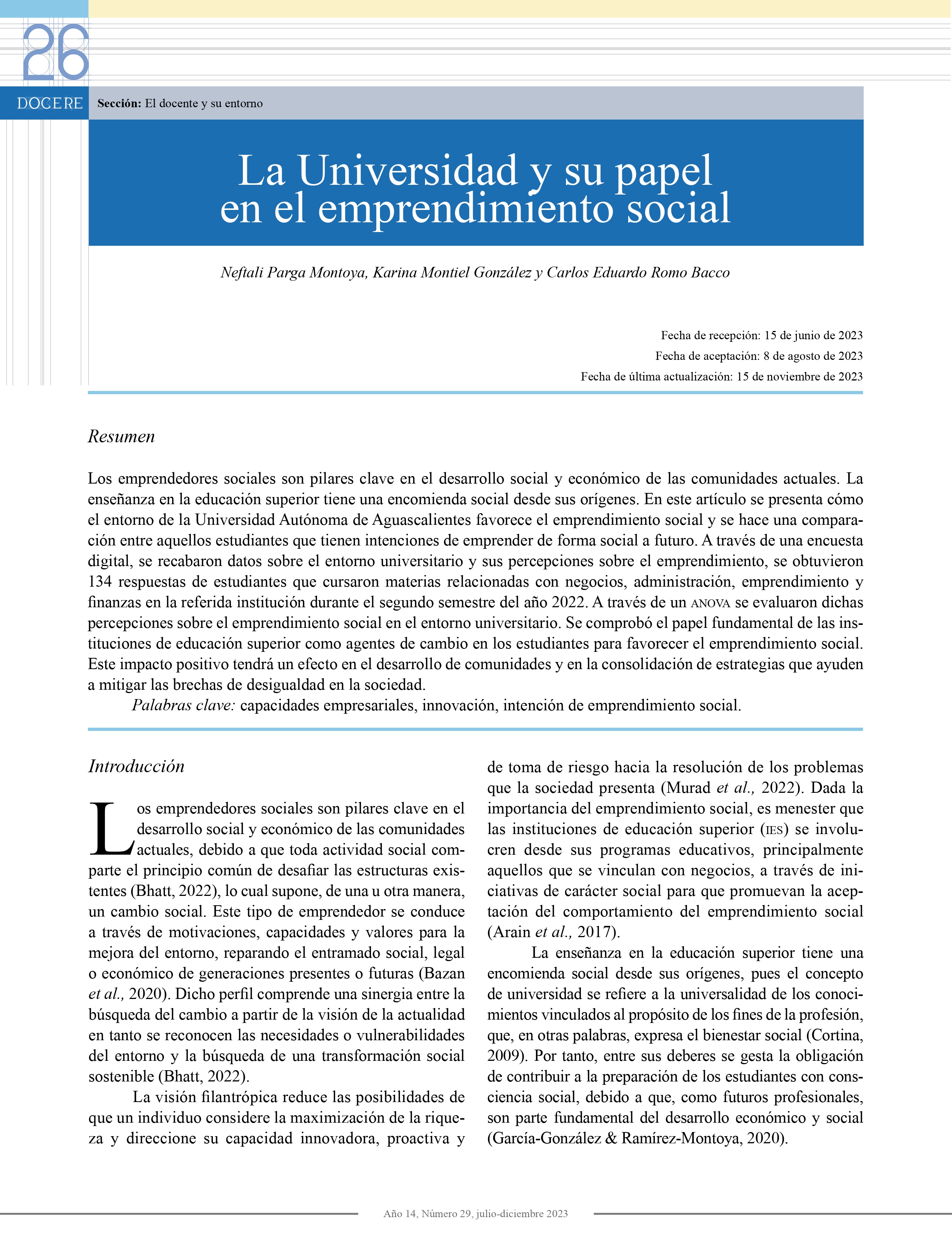The University and Its Role in Social Entrepreneurship
DOI:
https://doi.org/10.33064/2023docere295076Keywords:
entrepreneurial capabilities, innovation, social entrepreneurship intentionAbstract
Social entrepreneurs are key pillars in the social and economic development of today's communities. Teaching in higher education has a social mandate since its inception. This article presents how the environment at the Universidad Autónoma de Aguascalientes fosters social entrepreneurship and compares students who have intentions to undertake social ventures in the future. Through a digital survey, data was collected on the university environment and its perceptions of entrepreneurship, yielding 134 responses from students who took courses related to business, management, entrepreneurship, and finance at the institution during the second semester of 2022. An ANOVA was used to evaluate these perceptions of social entrepreneurship in the university environment. The fundamental role of higher education institutions as change agents for students to promote social entrepreneurship was confirmed. This positive impact will have an effect on the development of communities and the consolidation of strategies that help mitigate inequality gaps in society.
Translated by Alexia Carolina Cruz Rodríguez.
Downloads
Metrics
References
Arain, G. A., Sheikh, A., Hameed, I. & Asadullah, M. A. (2017). Do as I do: The effect of teachers’ ethical leadership on business students’ academic citizenshipbehaviors. Ethics and Behavior, 27(8), 665-680. https://doi.org/10.1080/10508422.2016.1272457
Araya-Pizarro, S. (2021). Autoconfianza y actitud hacia la enseñanza del emprendimiento. Cuadernos de Investigación Educativa, 12(2). https://doi.org/10.18861/cied.2021.12.2.3091
Barra, E. (1987). El desarrollo moral: una introducción a la teoría de Kohlberg. Revista Latinoamericana de Psicología, 19(1), 7-18. https://www.redalyc.org/articulo.oa?id=80519101
Bazan, C., Gaultois, H., Shaikh, A.,… (2020). Effect of the university on the social entrepreneurial intention of students. New England Journal of Entrepreneurship, 23(1), 3-24. https://doi.org/10.1108/NEJE-05-2019-0026
Bhatt, B. (2022). Ethical complexity of social change: Negotiated actions of a social enterprise. Journal of Business Ethics, 177(4), 743-762. https://doi.org/10.1007/s10551-022-05100-6
CONEVAL. (2023). Medición de la pobreza en México. Ciudad de México. https://www.coneval.org.mx/Medicion/Paginas/PobrezaInicio.aspx
Cortina, A. (2009). Ética para las profesiones del siglo XXI. Universidad Iberoamericana León.
Diario Oficial de la Federación (DOF) (2022, 16 de marzo). Reglamento de becas para el fortalecimiento de la comunidad de humanidades, ciencias, tecnologías e innovación. https://acortar.link/qWbMkM
García-González, A. & Ramírez-Montoya, M. S. (2020). Educación en emprendimiento social desde una mirada transdisciplinar. CIIE Revista del Congreso Internacional de Innovación Educativa, 7(5), 176-182.
Mair, J. & Noboa, E. (2006). Social entrepreneurship: How intentions to create a social venture are formed. En Social entrepreneurship (pp. 121-135). London: Palgrave Macmillan, UK.
Murad, M., Ashraf, S., Syed, N.,… (2022). Entrepreneurial social identities and nascent entrepreneurial behaviour: Mediating role of entrepreneurial selfefficacy. Entrepreneurial Business and Economics Review, 10(1), 129-143. https://doi.org/10.15678/EBER.2022.100109
Pesantez, Z., López, K. & Paz, R. (2021). El desarrollo de las competencias generales en jóvenes universitarios para el emprendimiento sustentable. Conrado, 17(82), 402-410. https://acortar.link/GnoJnd
Ponce, D., Albarracín, L. & Viteri, X. (2020). Modelo de formación de competencias en ética y responsabilidad social para el profesional postmoderno. Conrado, 16(75), 61-68. https://acortar.link/By6qXy
Rodríguez, M. & Urbiola, A. (2019). Capital Social y Emprendimiento: reflexiones teóricas. Revista Venezolana de Gerencia, 24(85), 13-29. https://doi.org/10.37960/revista.v24i85.23784
Tornikoski, E. & Maalaoui, A. (2019). Critical reflections–The Theory of Planned Behaviour: An interview with Icek Ajzen with implications for entrepreneurship research. International Small Business Journal: Researching Entrepreneurship, 37(5), 536-550. https://doi.org/10.1177/0266242619829681
Villoro, L. (2017). El poder y el valor: fundamentos de una ética política. Fondo de Cultura Económica.

Downloads
Published
How to Cite
Issue
Section
License
Esta obra está bajo una Licencia Creative Commons Atribución-NoComercial-CompartirIgual 4.0 Internacional.
El lector y/o usuario que utilice el material publicado en la revista DOCERE de la Universidad Autónoma de Aguascalientes, deberá en todos los casos: a) Reconocer la autoría del material utilizado, proporcionando un enlace a la licencia, además de indicar sí se han realizado cambios al material; b) Queda prohibido utilizar el material proveniente de la revista DOCERE, con finalidad comercial y, C) En los casos en los que se realice la remezcla, transformación o creación, a partir del material publicado de la revista DOCERE, se deberá dar reconocimiento de los derechos que correspondan a la Universidad Autónoma de Aguascalientes, en su carácter de titular de la materia protegible utilizada. En caso de infracción a lo antes dispuesto, el lector y/o usuario, se hará acreedor a las sanciones que establece la legislación de la materia.












